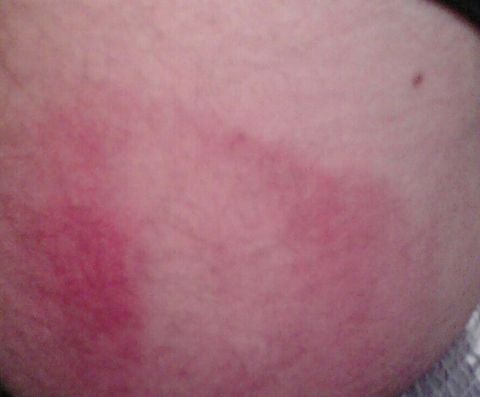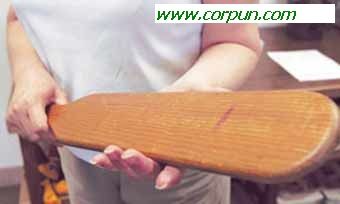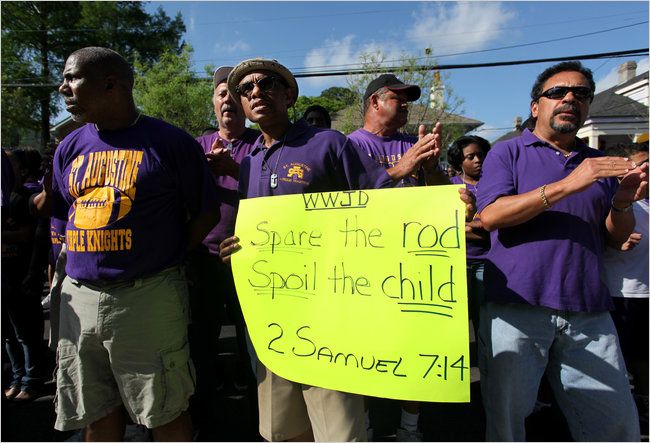|
Corpun file 23147 at www.corpun.com Times Record News, Wichita Falls, Texas, 4 March 2011CPS to investigate paddlingCity View student, 16, missed D-HallBy Ann Work
Child Protective Services has launched an investigation into City View Independent School District's spanking practices, according to Angie Herring, the mother of a 16-year-old City View student who was spanked Monday but still carried the red marks on his buttocks Thursday. Herring photographed the red marks and reported the spankings -- so severe, she said, that they crossed the line into abuse -- to CPS on its hotline Tuesday. Her report was followed up with a meeting Thursday with CPS officials, where she said they explained to her and her son the timeline of the investigation. "I can tell you, any time there are allegations of abuse or neglect in a school setting, we are mandated to investigate if it meets the criteria of abuse as stated in the Texas Family Code," said Marleigh Meisner, public information officer for CPS. According to the Texas Family Code, section 261.001, abuse includes "physical injury that results in substantial harm to the child," but excludes an accident or "reasonable discipline" by a parent or guardian. Another City View parent, Charlotte Beaver, reported Thursday that CPS official Patricia Alford notified her of an open investigation of the school and asked questions about her daughter's experience with the school's spanking policy. As recently as Dec. 11, 2010, Beaver had complained to the Times Record News that her daughter and another student had been spanked at the school for going to the bathroom during a passing period, which Beaver deemed harsh.
The CPS investigation originated when Herring's 16-year-old son came home from school Monday and said, "Mom, you need to look at this." The boy pulled down his jeans far enough for his mother to see bright red paddle marks on his buttocks with a welt forming. "Look at what he did to me," her son said. He described being spanked with three swats from a paddle that afternoon by City View Junior/Senior High School Assistant Principal Daryl Frazier because he didn't show up for an assigned D-Hall. Frazier administers all corporal punishment -- for both boys and girls -- at the northside high school. Even though Herring's son had been spanked for misbehavior many times since he enrolled at the City View school in August, Herring said this was the first time that he had come to her complaining about pain and redness. "That's when I stopped everything I was doing and said, 'I need to take pictures of that,'" Herring said. She took pictures again the next day of her son's still-reddened buttocks. She also took her son -- and the pictures -- to United Regional Medical Center's emergency room Tuesday to be looked at by doctors, who called the injury "a very deep contusion," caused by damage to the soft tissues underneath the skin and bleeding in the injured area. While at the hospital, Herring reported the injury to two Wichita Falls police officers, who took an incident report but, she said, downplayed the injury, calling it "just a bruise." She said they called the injury "corporal punishment" and defended the practice for children who had not been taught the rules by their parents. When she asked them to notify Child Protective Services, the officers refused, she said, so Herring reported the incident herself later that day to Child Protective Services through its hotline. The incident prompted an open investigation of City View by Child Protective Services, according to CPS representative Patricia Alford. She said she planned to visit City View Junior/Senior High School today to talk to the students. Herring and her son also met with CPS representatives Thursday, who explained to them how the investigation would proceed.
They asked Herring if she had previously approved corporal punishment for her son, and she said she had. "But this has gone beyond corporal punishment," she told them. "This has gone beyond the handbook." Corporal punishment has been a key part of City View's discipline policy for years. On Wednesday, TRN made repeated calls to City View's Frazier and Junior/Senior High School Principal Raymond Weathersbee. None were returned. Calls on Wednesday to Superintendent Steve Harris also were not returned. TRN visited the City View Junior/Senior High School Thursday morning to interview either Frazier or Weathersbee but were turned away by Weathersbee, who said, "I can't say anything. Mr. (Steve) Harris instructed me not to say anything. That was my instruction." When TRN attempted to reach Harris again Thursday, Harris told TRN through his secretary that he "will not be available to you today." He later returned the phone call, saying, "I don't have any information." Harris said he did not know about the situation, had not seen photos of the boy's injury, was "still finding out details for myself," and didn't know the mother or the son in question. However, he was sure of one fact, he said: Any claim that the boy did not receive a choice about his spanking was false, he said. "There was a choice, I can tell you that. The kid made the choice." The 16-year-old told TRN that he was given no choice about the spanking on this particular occasion. He was pulled out of the hallway when he was on his way to his computer class, he said, and told by Frazier to go to his office. "He showed me a referral, that I had missed a D-hall, so I would be getting three swats for it. He told me to get in position for it." The student described "the position" as being similar to how you'd stand if you were trying to catch a baseball. He received three spankings administered by Frazier with a paddle. "The second one was the hardest," the boy said. A woman was in the room as a witness, he said. After the paddlings, he went to his computer class. Herring estimated that her son had received as many as 50 paddlings -- two or three at a time -- since he transferred to City View from Wichita Falls High School in August for infractions that ranged, according to the boy, from cussing in the cafeteria to dress code violations. Frazier met with Herring and her son in December, Herring said, and they agreed that spankings were not an effective deterrent for her son, and Frazier told her he would discipline him some other way. Since then, she has called Frazier, she said, and left messages on his answering machine, asking for her son's discipline records to find out how he was behaving. "He's never, ever returned my call," she said. The 16-year-old admitted that he doesn't follow the rules all the time. "Everybody has their mess-ups," he said. "But that is the most retarded way to punish somebody in the world." When he was a student at Wichita Falls High School, he was punished most often by doing detention in the principal's office and then after school in the cafeteria. Herring visited City View Junior/Senior High School Wednesday to talk about the spanking with Frazier, and, while she was there, she snapped a picture of a sign hanging in Frazier's office that read, "The beatings will continue until the morale improves." Frazier told Herring that he had already apologized to her son. "If you did nothing bad, why did you apologize?" Herring asked. She said Frazier told her that he was afraid he'd hit the boy's tailbone, but continued to claim that he had done nothing wrong. "I said, 'Pictures speak 1,000 words. How dare you do that to my child. You assaulted my child," Herring told him. She said she is speaking out so that no other child will be subjected to such treatment. When she spoke to Weathersbee about the spanking, she said, "He was on Mr. Frazier's side. He said some kids bruise easier than others. I said, 'Is that all you have to say?' He said, 'What do you want me to say?' I said, 'That it was a little excessive.'" According to the Attorney General's Office, corporal punishment becomes abusive "only if 'observable and material impairment' occurs as a result." In the Texas Penal Code section 9.62, there is considerable leeway given in the educator/student relationship to use force in some situations, according to Sgt. Joe Snyder, public information officer for the Wichita Falls Police Department. An educator is given permission to use "force, but not deadly force, against a person," according to the Code. "The use of 'force but not deadly force' would seem to say you can use any force except killing them," Snyder said. © 2011 Times Record News. All rights reserved.
Corpun file 23137 at www.corpun.com
Mail Online (web only), London, 5 March 2011'Spank me': Catholic schoolboys rally in SUPPORT of paddling as corporal punishment is debatedBy Daily Mail Reporter It's unlikely most schoolboys would want to be spanked and end up with a red bottom when they misbehave. But students at St Augustine High School in New Orleans, Louisiana, have been holding a rally to support corporal punishment at the school, including paddling. The practice was put on hold this year by the board of trustees after the Archbishop of New Orleans, Gregory Aymond, 61, said it does not belong in a Catholic school.
Hundreds of students at the predominately African-American school chanted in unison during a rally: 'Leave St Aug alone, leave St Aug alone'. St Augustine student Ajani Gibson told the crowd: 'Regardless of how you may personally feel about the paddle -- what our school is doing works. 'It's seen by the very low drop-out rates we have at this school.' Student Jacob Washington added: 'You're not just taking away a form of discipline, you're taking away a way of life at St Augustine.' The rally comes one week after a heated town hall debate with parents, teachers, alumni and New Orleans Archdiocese members, reported WWLTV.
St Augustine has used paddling throughout its history, but it is the only Catholic school in New Orleans to still practice corporal punishment - against Archdiocese policies. 'Hitting a child, or a young man, does not build character,' Archbishop Aymond said, adding that it could also cause 'emotional and physical harm'. Current corporal punishment practices are 'excessive and unreasonable' and do not include enough 'safeguards for preventing abuse', he said. But the majority of the administration, faculty and alumni are said to be in favour of it continuing, according to St Augustine board director Daniel Daviller.
Most students and parents are in favour as long as group punishment is stopped. Eunice Williams, a St Augustine parent, said: 'I do think it should be allowed here. 'That's one of the reasons I sent my son to St Augustine. The system failed me with my other two sons, my older boys.' School officials said they stand behind the tradition, but discontinued it this year at the board of trustees' request. However they said they hope to bring it back in the future. The state's department of education said 56 out of 70 school districts in Louisiana still allow corporal punishment, but it is only used by 12 per cent of schools in America. © Associated Newspapers Ltd
Three TV news reports about the St Augustine saga, early March 2010: these are from CNN (8 March), Fox and ABC (both 4 March). The first shows excerpts from speeches at the rally; the second adds interviews with students, alumni and staff of the school. The third clip is padded out with a somewhat ill-informed discussion between three studio anchors in distant Arizona. HERE IS THE 1st OF 3 CLIPS: This video clip is not currently available. HERE IS THE 2nd OF 3 CLIPS: This video clip is not currently available. HERE IS THE 3rd OF 3 CLIPS: This video clip is not currently available. IMPORTANT: Copyright in these video materials rests with the original copyright holders. These brief excerpts are reproduced under the "fair use" doctrine Corpun file 23145 at www.corpun.com
The Times-Picayune, New Orleans, 6 March 2011St. Augustine High School corporal punishment debate is about more than the paddleBy Bruce Nolan Each weekday morning, 12-year-old Jesse Moore III rises at 5 a.m. at his home in Violet and carpools 14 miles to St. Augustine High School. Many days, when band practice is extended, he plays his trombone until 6:30 p.m., when his parents collect him for the ride home.
For this, they pay about $6,000 a year. But it's worth both the money and the effort, said his mother, Jennifer Doane. The family enrolled Jesse last fall as soon as St. Augustine opened its new sixth grade. "They accept no less than the very best," she said. "No less than excellence." Given that fierce appreciation, parents like Doane, as well as alumni and students, are pushing back at Archbishop Gregory Aymond's desire to see St. Augustine abandon corporal punishment, a tradition that has been part of its character-building tool kit for 60 years. Aymond has said corporal punishment institutionalizes violence and runs counter to both Catholic teaching and good educational practice. It also violates local archdiocesan school policy. Given Aymond's quiet but clear reservations and the school's celebrated reputation for success, debate over St. Augustine's methods has raged. But it's not all about the wooden paddle.
In fact, according the Rev. John Raphael, the president of St. Augustine, it's not even mostly about the paddle. In Raphael's view, Aymond and the Josephite trustees, who last fall imposed a temporary paddling ban at the school they founded, have dismissed St. Augustine's record of success, and more deeply, African-American parents' desire to educate and discipline their children in their own traditions. Absent any scandal or evidence of abuse, "it is insulting to suggest that our 60 years of experience with kids would have left us harming them and continuing to harm them," Raphael said in an interview. To St. Augustine parents and alumni, the push to end corporal punishment sounds paternalistic, Raphael said. "It's as if critics are saying, 'We know what's best for you. We're going to help you raise your children. Obviously you disagree with us, but we know better.'" He continued: "Why do African-American families have to beg permission from folks in another culture to raise their kids in the Judeo-Christian tradition that has sustained our culture for so many generations?" Part of that independence was on display Friday morning, when St. Augustine's 650 students assembled in the schoolyard, nominally in support of the paddle, but more broadly in support of allowing the school to make its own way in forming students. Raphael and others said the deeper issue became more inflamed last week in an unlikely place: Aymond's weekly video address to the Catholic community on the Archdiocese of New Orleans' website. There Aymond unveiled an upcoming church initiative to counter the street violence and murder rate in New Orleans -- among the nation's worst. Then he pivoted to the subject of St. Augustine. While praising the school's accomplishments, he explained his theological and psychological objections to corporal punishment. Aymond acknowledged that there might be cultural differences in play and said he had not come to a final conclusion. But he also said: "I truly believe that we teach violence by being violent." Some viewers said they saw that as an implied linkage between St. Augustine alumni and street crime. The video spread rapidly. "I can tell you I was livid over that," said Vernon Martin, a retired corporate human relations executive who helps run the St. Augustine alumni chapter in Atlanta. On Friday Aymond apologized for any unintended suggestion that St. Augustine's discipline had anything to do with crime. They are separate topics that he thought he was treating as separate. "Clearly, the people of St. Aug are faith-filled leaders in our community." Beyond that, he said, he has asked school administrators and representatives of the Josephites to meet privately with him to work out differences "in as reconciling a way as possible." Board was trumpedThe lines of disagreement are more complicated than they first appear. Aymond raised his concerns about corporal punishment shortly after his arrival in New Orleans in 2009, but Raphael said the Josephites, a Baltimore-based order of Catholic priests who founded St. Augustine in 1951, had already begun to signal reservations about the practice. At Aymond's request, St. Augustine's local board of directors last year thoroughly reviewed disciplinary policy, including corporal punishment, in conversations with parents, alumni and faculty. The review panel included Monica Applewhite, a social worker and national expert on safe environments representing Aymond's interest. The result was a general reaffirmation of corporal punishment, with two modifications: an end to collective punishment and the designation of certain faculty members to wield the paddle, Raphael said. But on the eve of school's opening, the Josephite trustees in Baltimore, who had been in conversations with Aymond, trumped the local board and banned the paddle. "We're in a period of indefinite moratorium," Raphael said in an appearance on WBOK radio last week. "That really put us in a difficult and awkward position," and produced internal strains that still endure, said alumnus Troy Henry, the engineer and former mayoral candidate who leads the school's local board. A spokesman for the order was not available for comment Friday. Lone outlierBeyond issues of governance and mutual respect, of course, is the matter of the paddle itself and its place in the classroom. Without corporal punishment this year, Raphael told the radio audience: "Kids who ordinarily would not get Saturday detentions are now getting Saturday detentions. Kids who would not get a suspension are now getting suspensions. And unfortunately, I have to say, there may have been one or two students dismissed who probably would not have been dismissed." Raphael pointed out that corporal punishment in legal in 20 states. "That there is a debate, there's no question," he said. "But there certainly is no morally definitive, jury-is-in, the-question-is-over" resolution. Meanwhile, the Center for Effective Discipline, a national nonprofit advocacy group that educates against corporal punishment, said it long ago identified St. Augustine on its website as the lone outlier among Catholic schools still embracing corporal punishment. Robert Fathman, a clinical psychologist who helped found the movement, said an enormous body of educational research rejects the utility of corporal punishment. So do dozens of professional associations of doctors, nurses, psychologists, teachers, principals and parent groups collected on the center's website. "The paddle is not a tool. The paddle is a weapon. It's designed to inflict pain," Fathman said. "Not a single developed country in the world but us allows a teacher to hit. Not in Europe, Mexico, China, Japan, Canada, all of Europe, Israel." Fathman said there are other ways to administer effective discipline. "And I can tell the (St. Augustine) alumni that alumni of other Catholic high schools achieve success without being hit." Yet for many, including Martin and Doane, the paddle has proved to be a minor but indispensable part of the St. Augustine way. It teaches quick accountability: "For every action there is a reaction," Martin said. "I want the paddle," said Doane, the mother. But at the moment, Raphael said, he sees a deeper challenge. "It's not the paddle that makes St. Aug," he said. "St. Aug will stop being St. Aug if ... (we) decided that because someone else doesn't like what we do, we say, 'Well, there's nothing we can do.'" © 2010 New Orleans Net LLC. All Rights Reserved.
Corpun file 23144 at www.corpun.com
Fort Worth Star-Telegram, Texas, 6 March 2011Thousands of students still take their licks in Texas schoolsBy Melody McDonald
Last year, the blue-collar town of Temple found itself in the spotlight after its school board decided to reinstate corporal punishment. National journalists headed to Central Texas to report that in some towns, it's OK to give licks to misbehaving students. Supporters and opponents debated the old-school discipline in chat rooms and on message boards. People, it seemed, had plenty to say about a school district bringing back the paddle. But for hundreds of Texas schools, including some in North Texas, the paddle has never stopped swinging. "I think most people are surprised that it still goes on, especially in other parts of the country," said Jimmy Dunne, president of People Opposed to Paddling Students, a Houston-based organization that has worked to abolish corporal punishment in Texas schools since the 1980s. "I don't think there is any place for paddling. I think it's child abuse and it should be banned." State Rep. Alma Allen, D-Houston, agrees. In January, she introduced House Bill 916, which seeks to ban corporal punishment in all Texas school districts -- her fourth effort to pass an anti-paddling law. "Only 40 of 1,033 school districts in the state of Texas have banned it, so we have a long way to go," said Allen, a retired principal with the Houston school district, which no longer paddles students. "This, for me, is a really daunting issue. Schools should be happy places. Children cannot learn in an environment that is threatening. I don't want to go anywhere where someone is going to beat me." Texas is one of 20 states, most of them in the Bible Belt, that still allow corporal punishment in schools. During the 2006-07 school year, the most recent period with statewide statistics available, more than 49,000 Texas students were paddled, putting Texas at the top of the list, according to the U.S. Education Department's Office for Civil Rights. But the punishment continues to be a controversial and confusing subject, partly because school districts make their own policies and the line between discipline and abuse can be blurred. In North Texas, most of the big districts, including Fort Worth, Dallas and Arlington, have policies against it. Others, including Everman and White Settlement, allow paddling but rarely use it. Many other districts, especially in rural areas, regularly paddle students. Springtown has used corporal punishment at least 103 times this school year, while Alvarado has used it at least 46 times and Godley 21 times. Those who support paddling say it deters bad behavior. "Rep. Allen is 72 years old, and she is out of touch with reality," said Gilbert Leal, a political consultant and former substitute teacher who started the website bringbacklicks.com last year in an effort to reinstate corporal punishment in the Dallas school district. "I'm not trying to discredit her, but when is the last time she was in the classroom?" Leal said. "If anything, she should remember the good old days when there was no such thing as in-school suspension. It was just the looming threat of the paddle -- and that was enough." Pediatricians opposedMost experts agree that social acceptance of spanking has waned in the past several years, perhaps reflecting the changing views of the medical profession. The American Academy of Pediatrics has recommended that corporal punishment be abolished in all schools by law because "it may affect adversely a student's self-image and school achievement and ... it may contribute to disruptive and violent student behavior." Dr. David Sabine, a clinical psychologist in Wichita Falls, said 30 states have banned it for a reason. "Only those ignorant of what works in shaping behavior -- or those who remain intentionally blind to it -- can maintain a defense of corporal punishment," Sabine said. "It teaches the child to use violence to achieve one's desired ends. If you think a child knows the difference between their being aggressive to a peer and an authority being aggressive to them, think again. Social-learning psychologists have shown definitively that children are major imitators. They do what they have seen others do. ... I love my state, but the fact that this policy endures is embarrassing and tragic." Rep. Harold Dutton, D-Houston, an outspoken supporter of corporal punishment who passed a bill in 2005 that reaffirmed parents' rights to paddle, remains steadfast in his belief that paddling should be a tool for parents and educators when a child needs an attitude adjustment. "Discipline is designed to teach that bad choices lead to bad consequences," he said. "We're not talking about abusing kids. We're talking about a situation where a child has engaged in certain activities that need correction. If you don't allow corporal punishment as a discipline tool, administrators will increasingly suspend students and put them out of school. And which is worse?" 'A last resort'In Texas, the decision to use corporal punishment rests with each district's school board, which outlines its policies in its student code of conduct. The Texas Association of School Boards recommends guidelines and provides "model" policies to follow, but ultimately each district is free to do what it wants. In many districts, including Cleburne, Godley, and Springtown, spankings are often given instead of detention, suspension or other discipline, and after consultation with a parent. Many districts also specify that the principal must administer corporal punishment, out of view of other students. "Teachers and coaches are not allowed to administer corporal punishment," said Burleson Superintendent Richard Crummel. "There are a plethora of methods available to redirect inappropriate behaviors without resorting to corporal punishment, so it is used as a last resort -- primarily at the request of the parent." In Temple, only one student has been paddled since corporal punishment was reinstated last year -- and that was at a parent's request. John Hancock, Temple's assistant superintendent of administration, said corporal punishment was brought back because parents who paddled their children at home wanted consistent discipline at school. Students whose parents oppose corporal punishment will not be spanked, he said. "If you don't want your child paddled, I'm here to see that it does not happen," Hancock said. "It's an issue over which individuals are divided, and our goal is to be respectful of both sides." Hancock said school officials are constantly evaluating their policy and appreciate the ability to change it to fit the needs of their students and community. "Traditionally, we have been a state where local control was valued," he said. "It's complex and it's personal and, certainly, one would want the wishes of the local community to be considered. It's not a simplistic issue." Rep. Allen knows it will be a challenge to take the paddle out of Texans' hands, but she vows to keep trying. "Texas is a Bible Belt state and they truly believe 'Spare the rod, spoil the child,'" Allen said. "We come from a Christian perspective, that this is what we are supposed to do. I'm not to the point where I'm thinking it will pass, but I'm feeling good about the amount of support we have and about the people who are willing to come down and testify and rally and rattle cages. "We're making progress," she said. "It will be my cause." Staff writer Shirley Jinkins contributed to this report. Fort Worth, Dallas, Arlington, Mansfield, Lewisville and Keller are among area school districts where corporal punishment is prohibited. But the old-school discipline is still on the books in many North Texas schools: Alvarado Corporal punishment was used 107 times during the 2009-10 school year and 46 times this year. All parents fill out a form at the start of the year to indicate whether they want their child to receive corporal punishment. All parents are contacted before the discipline is administered. Azle Corporal punishment was used 27 times during the 2009-10 school year and 13 times this year. The district honors requests from parents who don't want their child paddled. Burleson Corporal punishment was used 22 times during the 2009-10 school year and seven times this year. Cleburne Corporal punishment was used 72 times during the 2009-10 school year and at least five times this year. Although the punishment is allowed districtwide, the high school is the only campus where it is being used, with parental approval. Eagle-Mountain Saginaw Corporal punishment was used once during the 2009-10 school year and no times this year. The district honors parents' requests not to paddle their child. Everman While Everman allows corporal punishment, it's not being used at this time. Godley Corporal punishment was used 37 times during the 2009-10 school year and 21 times this year. Parents can sign a form at the start of the year if they do not want their child paddled. Swats are sometimes given instead of lunch detention or after-school detention. Hurst-Euless-Bedford Corporal punishment is allowed but not currently used. The policy specifies that it can be used only after less-stringent measures have been tried. Joshua Corporal punishment was used 30 times during the 2009-10 school year and 12 times this year. The district honors requests from parents who don't want their child paddled. Springtown Corporal punishment has been used at least 103 times this school year. Numbers for the 2009-10 school year were unavailable. In most cases, students opt for corporal punishment instead of in-school suspension, or the parent requested it. Elementary campuses do not use corporal punishment. White Settlement Corporal punishment is included in the student code of conduct. But it has not been used in the last two years. Source: Area school districts. Most numbers are through January. Corpun file 23146 at www.corpun.com The Rocky Mount Telegram, North Carolina, 7 March 2011School board repeals paddle policyBy Jim Holt
NASHVILLE -- Effective this morning, principals in Nash-Rocky Mount Public Schools no longer are allowed to paddle students. The Nash-Rocky Mount Board of Education repealed its policy on corporal punishment with a 6-5 vote Monday after a lengthy discussion over the pros and cons of corporal punishment in the school district. Board Vice Chairwoman Evelyn Bulluck said in the 2009-10 school year, 97 students were paddled. Of those 97, 50 students received corporal punishment more than once, she said. "When you really look at it, we have less than 100 students who are benefiting from corporal punishment," she said. "We have approximately 17,250 students. I think these schools who do use this policy might do well in looking at what the other schools are doing." She said the numbers show that corporal punishment isn't working. After speaking with principals and assistant principals, board member Gregory Camp said while he doesn't favor corporal punishment, it's not a tool he wants to remove from an administrator's toolbox. "From what I've heard, it's not just the use of it, it's the threat or the deterrent effect of a principal being able to do it," Camp said. "So the fact that it was actually administered a certain amount of times is not actually indicative of the success principals have with using the ability to have corporal punishment." Board member Doneva Chavis-Battle said she doesn't believe it is the job of the school system to replace the parent in terms of disciplining their children. "Yes, principals need a lot of strong tools to use, but if other school systems across the state have found ways to get around corporal punishment but still effectively educate, I say give the discipline area back to the parent," she said. Chavis-Battle said she's a strong believer in rewarding the good and punishing the bad. "You'd be amazed if you start taking electronic devices from kids how they straighten up nowadays," she said. Board members who voted to do away with the policy were Board Chairman Bob Jenkins, Bulluck, Chavis-Battle, Jon Hardy, Franklin Lamm and Joseph Edge. Voting against the policy's repeal were Camp, Robert Bynum, Brenda Brown, Bonnie Batts and Reginald Silver. Copyright 2010 Rocky Mount Telegram. All rights reserved Corpun file 23181 at www.corpun.com
katv.com (KATV Channel 7), Little Rock, Arkansas, 12 March 2011Billboard Aims To Ban Corporal Punishment In Arkansas SchoolsBy Michelle Rupp
In Central Arkansas, Little Rock, North Little Rock and Pulaski County schools prohibit the use of corporal punishment. Along with Conway schools in Faulkner County. In Saline County, Benton and Bryant school districts do allow corporal punishment but parents must sign waivers. "Well I don't paddle as a parent, I don't believe in spanking. I feel like there is a better way to get your point across to your child and help them learn from their mistake. I feel like paddling is wrong" says Laura Anne Warren of Little Rock. Tammy Bowers from Little Rock says, "we just moved here and I have three more in the school district and I can't have that. You can't beat on my babies." The sponsors of the billboard want to ban this type of punishment nationwide. All content © Copyright 2000 - 2011 WorldNow and KATV. All Rights Reserved.
Corpun file 23188 at www.corpun.com Times Record News, Wichita Falls, Texas, 12 March 2011Paddled teen to testify in AustinHouse bill would ban spankingsBy Ann Work
A City View high school student who was paddled so hard at school Feb. 28 that it left red marks and welts on his bottom that lasted for days will testify in Austin for House Bill 916, a bill designed to end corporal punishment in Texas schools. Tyler Anastopoulos, 16, will testify before the Public Education Committee Tuesday. He will be given three minutes to tell his story, according to Dax-Devlon Ross, a staff member with the Unlimited Justice Campaign. Photos of his reddened bottom will also be released to legislators with the permission of Anastopoulos and his mother, Angie Herring. Both mother and son say they are committed to stopping spankings for all children. The 16-year-old, who was spanked because he didn't show up for a detention hall session, will tell legislators about the mental and emotional pain associated with spanking and tell them whether his behavior was corrected as a result of the paddling. He will also comment on how effective he believes the spankings were to reprimand or punish him, Ross said. "It's very important to have the personal story of a young person who has been a victim of corporal punishment and can speak about it and give personal experience so legislators can begin to understand the impact it has, not only on him personally but on the larger community," Ross said. Ross is a staff member with the organization, Unlimited Justice, which is covering the cost of the trip that will bring Tyler and Herring to Austin and enable him to testify for the bill that was authored by Rep. Alma Allen, from Houston. He will also participate in a rally and be treated to a tour of the Capitol building. The City View student made the news when his mother reported the injury to Child Protective Services and complained to the Times Record News in a story that ran March 4 titled, "CPS to Investigate Spanking," that was picked up by the Unlimited Justice organization. Anastopoulos was spanked Feb. 28 by City View Junior/Senior High Assistant Principal Daryl Frazier, who administers all discipline at the school. His spanking of two female 17-year-olds at the school in December 2010 also made the news when the girls' parents complained to TRN that going to the bathroom during a passing period instead of during a lunch period did not warrant a spanking. According to Anastopoulos, he was not given a choice about the Feb. 28 spanking but was told to report to the assistant principal's office, was informed that he had missed a D-hall and would be given three "licks" for it. Students are supposed to be given a choice of a paddling or some other disciplinary option. The boy's mother also criticized Frazier for hanging a sign in his office that read, "The beatings will continue until morale improves." Helping bring Herring and her son to Austin to testify is part of a 30-year effort on Jimmy Dunne's part to eradicate spanking in Texas, he said. In 1981, he started an organization called, "People Opposed to Padding Students," or POPS. He also has a website, www.nospankingzone.org. As an educator, he once paddled students but then thought better of it. "I started thinking, 'Why are we doing this?' I noticed some teachers getting sadistic pleasure out of it. ... It was the thing we were told to do, but it doesn't work. It makes kids angry," he said. He has learned a lot about the aftereffects of spanking in the past 30 years and said he has heard many reports from school nurses who discover children with black and blue bruises on their bottoms and are surprised to learn that the child received the spankings at school. "I flat out call it child abuse," Dunne said. "I don't call it discipline." © 2011 Scripps Newspaper Group
Corpun file 23187 at www.corpun.com
Fort Worth Star-Telegram, Texas, 14 March 2011Paddling is cheap, effective way to correct student behaviorBy E.R. Bills
If you've ever been hit good and solid by an aerated wooden paddle, you don't soon forget it. It stays etched in your mind through your derriere, and the impression it leaves in your memory is usually much worse than the bruising you suffered from the actual blow. I had one coach who would make me grab my ankles. Another would lash his index finger through one of my belt loops to hold the target steady. I had one emotional principal whose eyes would well up before he followed through. And the one hard-nosed instructor who remorselessly beat me to tears has a school named after him. I was on the receiving end of dozens of corporal punishments in elementary, junior high and high school. At the time, I'm certain I vehemently disagreed with every swat. But I can't say I didn't deserve them or that they didn't work. They always got my attention. They may not have held it for long, but I was definitely front-and-center for days if not weeks after in every case. It's not that I was a terrible kid. And I wasn't exactly a juvenile delinquent. I was just an academic contrarian with a jumbo disregard for authority. A swat instantly diminished my contrariness and restored my regard for school authorities. State Rep. Alma Allen, D-Houston, recently introduced a bill to ban corporal punishment in Texas for good, but I'm not sure the ban would be real good. I think many folks believe that Texas schools were run more effectively years ago in the days of near-universal corporal punishment. And -- though I'm no mathematician -- I'm pretty sure aerated wooden paddles cost less than the bureaucracy that's sprung up around our new punitive philosophies. As much as I despised some of the school officials who "tanned my hide," I'm glad I wasn't educated in the current kumbaya vs. exile dichotomy that governs many of our school systems. I'm glad no one sedated me to get me to be still and pay attention. I'm glad my school didn't have a full-fledged police department and police officers who wrote me tickets for public disturbances (as is the practice in some school districts). I'm glad I wasn't exiled to an "alternative" school when I didn't follow the rules or play nice. I usually fall into the liberal or progressive category on most social debates, but on this subject I'm torn. Corporal punishment is an explosive issue, and I'm not comfortable with defending it. But I don't think contemporary alternatives produce better school settings or more productive learning environments. Sure, they're more civil, but they don't seem to be more successful. I don't look back on the principals, coaches and teachers who corporally punished me with hate, contempt or malice. Now they seem like drill sergeants who marshaled me through a rough time. Some I regard higher than others, but not because they went easy on me. I gave as good as I got. And I'm glad there were folks back then with the resolve and wherewithal to set limits and succinctly enforce them. On the rare occasion when I get called to one of my children's schools to address their behavioral problems, I tell the principals or instructors that I sympathize with them because they're working with one hand tied behind their back -- specifically one hand with a paddle in it tied behind their back. It's not that I don't love or care about my children; just the opposite is true. I simply see myself in them and realize the anarchy our school systems court. We are human beings, but we're also mammals, and there aren't many land mammals that get raised without some form of physical correction. And when our mammalian relatives do it, we don't consider it abusive. Are we so far removed from nature that tried-and-true methods don't apply? Are we better off sinking untold millions (if not billions) into alternative schools and on-campus police departments? I'm not so sure. E.R. Bills is a writer from Aledo. Corpun file 23182 at www.corpun.com
KCEN-TV, Temple, Texas, 15 March 2011Anti-paddling advocates rally at State Capitol
"It feels somewhat like a yellow jacket. Kind of a deep sting," 17-year-old Tyler Anastopoulos said. During a rally at the capitol Tuesday, Anastopoulos told members of the media that he was swatted some 50-60 times for "petty reasons." "Missing D-halls[detention], chewing gum and I had an incident of profanity one time," Anastopoulos said. Anastopoulos' mother, Angie Herring says that she has seen the physical and psychological consequences of corporal punishment. "I almost have to push him out the door to get him to go to school. He's frustrated," Herring said. Relief could be on the way for Anastopoulos and hundreds of other Texas students. State Rep. Alma Allen (D-Houston) has authored House Bill 916 which aims to ban corporal punishment in Texas. "Texas school children have less protection than those in the penal institution. We do not administer corporal punishment in the penal institution," Rep. Allen said. The bill is getting bi-partisan support in the Texas House of Representatives. "It's a shame we have to come before you and ask for legislation to do something that the school districts should know is the right thing to do," Rep. Barbara Nash (R-Arlington) said. Paula Flowe, a spokeswomen for the grassroots organization The Hitting Stops Here, flew to Texas to testify Tuesday. She was told by security that she could not bring a paddle into the capitol. "In school this is a "teacher tool", but to walk in this building it becomes a weapon," Flowe said. "We are giving HB 916 until the middle of May to go through, and after that we will be having sleep overs here at the capitol. We will not stop until it's over." Rep. Allen's bill was left pending in the House Committee on Education Tuesday. Members of that committee will have to vote to pass it out of committee before it reaches the full House floor. © Copyright 2000 - 2011 WorldNow and KCEN All Rights Reserved.
Corpun file 23183 at www.corpun.com Abilene Reporter-News, Texas, 16 March 2011Proposal would ban Abilene ISD, area schools from using corporal punishmentPunishment common in Big CountryBy Mike Roark In Texas, corporal punishment is almost a cornerstone of how school districts administer discipline. A trip to the office for a paddling is a part of everyday life for some students. According to the student code of conduct found on websites of six Abilene-area school districts, all use corporal punishment as part of their disciplinary regimen. But that doesn't mean everyone agrees that paddling is the right way to discipline. State Rep. Alma Allen, Houston, has introduced a bill in the House to ban corporal punishment, which she said is child abuse that has far-reaching effects for Texas. Abilene Independent School District Superintendent Heath Burns said he generally supports corporal punishment, but with some restrictions. "I have worked in districts that permitted corporal punishment, and some that did not," Burns said. "Personally, I am a supporter of corporal punishment so long as it is used judiciously and with parent permission. "I respect a parent's right to refuse this punishment alternative, and would refrain from supporting spankings in the absence of parental permission. Candidly, I believe that many good choices I made as a youngster were made in efforts to avoid spankings at the hands of my parents, or school administrators," he added. Because it is spring break in the Big Country and all public schools are out for the week, no officials from other school districts in the area could be reached. Texas is one of 20 states that still allow paddling as a form of discipline. Allen said corporal punishment hinders education and makes students weary of attending school. "Texas is a brutal place to go to school," Allen said. "Not only does doling out spankings teach children violence, but it increases dropout rates and discourages children from learning," said Allen, a retired school principal. "School should be a happy place for children, a place of refuge, where children go to learn and socialize," she said. "Children have less protection than those in the penal system." More than 220,000 public school students are paddled each year across the country, and at least 10 percent of them seek medical attention as a result. [Note by C.F.: No source is cited for this unlikely claim.] In Texas, about 49,000 students were paddled in the 2006-07 school year, with a disproportionate amount of minorities and special education students receiving the licks, according to the U.S. Education Department's Office for Civil Rights. Tyler Anastopoulos, a Wichita Falls student, said he has been paddled 50 or 60 times at City View Junior-Senior High School -- all for minor incidents such as chewing gum or not having a proper haircut. He said the paddlings are administered by the school's vice principal. At school on Feb. 28 he was paddled and it left red marks and welts on his bottom that lasted for days. "It feels like if you've ever been stung by a yellow jacket, a very deep sting," Anastopoulos said of the paddling. "Corporal punishment needs to be done away with. They need to learn a different way of discipline." Angie Herring, Anastopoulos' mother, said her son's welts were so severe that she sought medical attention. She said she doesn't want to send her child to such a hostile environment. Anastopoulos testified this week before the Public Education Committee. The 16-year-old, who said he was spanked because he didn't show up for a detention hall session, told legislators about the mental and emotional pain associated with spanking. He also will comment on how effective he believes the spankings were to reprimand or punish him. The AISD's student code of conduct states the following about corporal punishment: "Corporal punishment is permitted as a corrective action to certain rules infractions to preserve an effective and orderly educational environment. Factors of student size and age, and the physical, mental and emotional conditions of the student shall be considered before the administration of any corporal punishment. "If a parent objects to corporal punishment, they need to contact the campus principal. Corporal punishment shall be limited to spanking or paddling and shall be administered only in accordance with the following guidelines: 1. The student will be informed of the reason(s) for corporal punishment. 2. Corporal punishment may be administered by the teacher, school principal, or assistant principal. 3. The instrument to be used in administering corporal punishment shall be approved by the principal. 4. The administration of corporal punishment shall be performed in the presence of one other professional employee of the District, and in a designated place out of view of other students." The Jim Ned school district's student code of conduct states the following information about corporal punishment: "Corporal punishment has been approved by the JNCISD Board of Trustees as an appropriate disciplinary consequence for Code of Conduct violations. "Corporal punishment is limited to spanking or paddling the student and will be administered only in accordance with the following guidelines: 1. The student shall be told the reason corporal punishment is being administered. 2. Corporal punishment shall be administered only by the principal, assistant principal, or a teacher. 3. The instrument to be used in administering corporal punishment shall be approved by the principal or a designee. 4. When corporal punishment is administered, it shall be done in the presence of one other District professional employee and shall take place in a designated place out of view of other students." The Associated Press and the Wichita Falls Times-Record contributed to this report. © 2011 Scripps Newspaper Group Corpun file 23194 at www.corpun.com
The Times-Picayune, New Orleans, 26 March 2011Hundreds march on archdiocese office to support St. Augustine paddling policyBy Kari Dequine
Garbed in the trademark purple of St. Augustine High School, more than 500 students, parents and other supporters of the 7th Ward institution's use of corporal punishment marched this morning on an Archdiocese of New Orleans office to deliver a message to Archbishop Gregory Aymond, who has called on school officials to abandon the 60-year disciplinary practice. They posted these demands on the locked door to the Walmsley Avenue office building: Retract statements linking St. Augustine students to violence; be transparent in investigating the punishment policy; and allow respective dialogue on the issue. Aymond has said corporal punishment institutionalizes violence, runs counter to both Catholic teaching and good educational practice, and violates local archdiocesan school policy. The Josephite trustees, who founded the school, imposed a temporary paddling ban last year, in circumvention of local school board wishes. In a weekly video address to the Catholic community pasted this month to the archdiocese's website, Aymond unveiled an upcoming church initiative to counter the street violence and murder rate in New Orleans, then pivoted to the subject of St. Augustine. The Rev. John Raphael, the president of St. Augustine, has said the issue is not as much about the wooden paddle as about the rights of African-American parents to educate and discipline their children in their own traditions. © NOLA.com. All rights reserved.
Corpun file 23253 at www.corpun.com The Post-Searchlight, Bainbridge, Georgia, 29 March 2011Parent reports school paddlingBy Brennan Leathers
A parent's complaint to school officials about her child being paddled has been resolved satisfactorily, School Superintendent Fred Rayfield said. Last Wednesday evening, the mother of a student at Jones-Wheat Elementary School reported to Bainbridge Public Safety that her child had been punished by Principal Larry Clark. The mother stated her son had been paddled four times with a wooden paddle and showed an officer bruises on her child's buttocks. According to Rayfield, the child in question was not punished for fighting with other students, as had been stated in the BPS incident report. However, the superintendent said he could not comment further on the details of the incident out of regard for the student's privacy. Rayfield stated that he now considered the matter satisfactorily resolved after the mother had meetings with the superintendent and Clark and with school administrators at Jones-Wheat. "The meetings went very well," Rayfield said. "The staff at Jones-Wheat are going to make adjustments related to the treatment of that student." According to Rayfield, Clark followed the Decatur County School Board's policy for the use of corporal punishment. Among the requirements of the policy, corporal punishment shall not be administered to a child whose parents or legal guardian file "a statement objecting to its use or from a medical doctor licensed in Georgia stating that is detrimental to the child's mental or emotional stability." Rayfield said each student's parents/guardians are given the opportunity to select whether they approve or disapprove of corporal punishment at the start of each school year. At any time during the school year, parents can change their preference. "If a parent were to say, for example, that their child is in sixth grade and they don't want him paddled for the rest of his school career, then we honor that," Rayfield said. It's up to the principal of each school to decide whether or not corporal punishment will be a part of their school's discipline plan or not. "Some of them [use it]; some of them don't," Rayfield said. Rayfield said the school board is currently in the process of reviewing its entire policy manual, including the corporal punishment policy. 2009 incident sparked paddling debateThe repeated paddling of a third-grader at Potter Street Elementary in February 2009 prompted a public debate about whether paddling should be allowed in local schools. Ultimately, the Board of Education disciplined the assistant principal who paddled the child on three different instances in one day. The assistant principal was suspended without pay for 10 days. Former School Superintendent Ralph Jones had suspended the use of corporal punishment immediately following the incident while the school board discussed and revised its corporal punishment policy. Corpun file 23220 at www.corpun.com
wjhg.com (WJHG-TV), Panama City, Florida, 29 March 2011Holmes County teacher accused of paddling an excessive number of studentsHolmes County school officials have completed an investigation into a teacher's excessive use of corporal punishment. The teacher paddled more than a dozen students in just 2 days. The school's superintendent says that won't be happening again.By Erica Rakow
"Corporal punishment is allowed in Holmes County as long as they follow the procedures which incorporates: Does a student understand why they're being paddled? Do they have a witness? We have a mandatory cap of 2 licks in Holmes county," said Superintendent of Holmes County Schools, Gary Galloway. But one Holmes County teacher is now prohibited from giving any licks. That, after being accused of paddling 11 students at Bonifay Middle School last Monday. On Tuesday, he allegedly paddled a 7th grade male student, leaving bruising. "A mother came in person with her son to document an injury to her child's leg that allegedly occurred while the child was paddled at school," said Bonifay Police Chief, Chris Wells. Galloway says he only heard from one parent. After investigating the allegation, Galloway decided to revoke the teacher's right to paddle students. "There was no excessive force used as far as we can determine. We did think the number was somewhat out of line," said Galloway. Galloway continued to say, "She said she didn't want to pursue it any further. She was satisfied. She did not think the teacher meant to do any harm to her student and certainly didn't want to get anyone in trouble". "Her words were, she wanted it documented so that there was no allegation made against her for child abuse or for causing the injury," said Chief Wells. To Galloway's knowledge, this is the first time this particular teacher has been flagged. The complaint and investigation will become part of the teacher's personnel file. The U.S. Department of Education says 200,000 school paddlings occur each year. Florida is one of 20 states that still allows corporal punishment but the number of paddlings has rapidly decreased. Copyright © 2002-2010 - Gray Television Group
Corpun file 23213 at www.corpun.com
The New York Times, 30 March 2011, p.A15EducationSchools Under Pressure to Spare the Rod ForeverBy Dan Frosch
When Tyler Anastopoulos got in trouble for skipping detention at his high school recently, he received the same punishment that students in parts of rural Texas have been getting for generations. Tyler, an 11th grader from Wichita Falls, was sent to the assistant principal and given three swift swats to the backside with a paddle, recalled Angie Herring, his mother. The blows were so severe that they caused deep bruises, and Tyler wound up in the hospital, Ms. Herring said. While the image of the high school principal patrolling the halls with paddle in hand is largely of the past, corporal punishment is still alive in 20 states, according to the Center for Effective Discipline, which tracks its use in schools around the country and encourages its end. Most of those states are in the South, where paddling remains ingrained in the social and family fabric of some communities. Each year, prodded by child safety advocates, state legislatures debate whether corporal punishment amounts to an archaic form of child abuse or an effective means of discipline. This month, Tyler, who attends City View Junior/Senior High School, told his story to lawmakers in Texas, which is considering a ban on corporal punishment. The same week, legislators in New Mexico voted to end the practice there. Texas schools, Ms. Herring fumed, appear to have free rein in disciplining a student, "as long as you don't kill him." "If I did that to my son," she said, "I'd go to jail." Steve Harris, the superintendent of the City View Independent School District in Wichita Falls, declined to comment in detail on the case but said his investigation of the school had found no wrongdoing. Corporal punishment, Mr. Harris pointed out, has long been "one of the tools in the toolbox we use for discipline." Up until about 25 years ago, corporal punishment in public schools could be found in all but a handful of states, said Nadine Block, the founder of the Center for Effective Discipline. Prompted by the threat of lawsuits and research that questioned its effectiveness, states gradually started banning the practice. According to estimates by the federal Department of Education, 223,190 children were subjected to corporal punishment in the 2005-6 school year. That was a nearly 20 percent drop from a few years earlier, Ms. Block said. In Texas, at least 27 of about 1,000 school districts still use corporal punishment, said Jimmy Dunne, the founder and president of another group that is against the practice, People Opposed to Paddling Students. That is enough to prompt advocates like Mr. Dunne to push to end the practice there. One bill being considered by the Legislature would permit corporal punishment only if parents specifically consent to it for their children. Another would ban it in schools altogether. "Hitting children in our schools with boards is child abuse, and it promotes child abuse at home," said Mr. Dunne, a former math teacher in Houston. "Parents see it's legal in schools and think it's O.K. to do at home."
In New Mexico -- where more than a third of the school districts permit corporal punishment, according to a local children's legal services group -- legislators approved a paddling ban this month. Gov. Susana Martinez, a Republican, has not indicated whether she will sign the bill. Opponents of the measure, like State Senator Vernon D. Asbill, worried that a ban would tie teachers' hands and make it harder for them to control students. "With parental supervision and parental approval, I believe it's appropriate," said Mr. Asbill, a Republican and a longtime teacher and school administrator from Carlsbad. "The threat of it keeps many of our kids in line so they can learn." But State Senator Cynthia Nava, a Democrat and a school superintendent from Las Cruces who supports the ban, said schools were no place for violence of any sort. "It's shocking to me that people got up on the floor and argued passionately to preserve it," she said of corporal punishment. "We should be educating kids that they can't solve problems with violence." Calls to end corporal punishment have gotten louder of late, even in states unlikely to pass a ban. In Mississippi, the family of a teenager who was paddled in school has filed a federal lawsuit. The suit, filed against the Tate County School District, claims that corporal punishment is unconstitutional because it is applied disproportionately to boys. The teenager's lawyer, Joe Murray, is also representing the family of another student who was paddled at the same high school this month. In that case, the boy was struck so hard that he passed out and broke his jaw, Mr. Murray said. An administrator who oversees the school district, James Malone, would not comment but said boys typically got in more trouble than girls. In Louisiana, where corporal punishment is also legal, controversy erupted this year after the board of trustees for St. Augustine High School, the lone Catholic school in New Orleans and perhaps the country that still paddled its students, decided to ban the practice. St. Augustine was under pressure from Archbishop Gregory Aymond of New Orleans, who has said that paddling promotes violence. But the school's administration and alumni want the practice reinstated. They argue that paddling for minor offenses has been instrumental in helping St. Augustine build character and achieve high graduation rates. The school's students have also voiced their support, holding a march in New Orleans to demand that the archbishop reverse his position. Jacob Washington, a senior and the student body president, helped organize the march. "This is a tradition for the school," he said. "It's how the school has been run for 60 years. Just the seniors alone -- we can tell the difference between our class and some of the newer students who didn't receive the same discipline." Corpun file 23221 at www.corpun.com
The Times-Picayune, New Orleans, 31 March 2011Letters to the EditorNew Orleans archbishop should stop meddling at St. Augustine High SchoolRe: "Who argues for a right to paddling?" Other Opinions, March 30.
The issue about St. Augustine High School's paddling policy is not about Dwight McKenna and Archbishop Aymond, as James Gill's article might imply, but about a tradition that is a part of the culture of one of the finest educational institutions in Louisiana -- one that just happens to educate African-American young boys and graduates them as men. I am a proud alumnus of St. Augustine. In my four years at St. Aug did I ever get paddled? You betcha! Was I humiliated? Not in the least. Did I garner the respect and admiration of my peers and classmates? Without a doubt! Did I go home and complain to my parents about having been paddled? No way, because I would have been told I more than likely deserved it. My parents, like all parents, knew the paddle was only one of the disciplinary measures used at St. Aug. They were clearly told if they objected to their son or sons being paddled to send them to another school.
At no time during my four years at St. Aug did I ever equate or even consider being paddled as a violent act. For this implication the archbishop needs to apologize to the institution, its current students and the many men across this country who attended and graduated from St. Augustine. The archbishop as well as the school's trustees, who happen to be more than 1,000 miles away from New Orleans, need to back away and stop interfering with an institution that works. Bring back the paddle and restore a tradition that is ingrained in the culture of St. Augustine. The archbishop, St. Aug's trustees and the Catholic Church have far greater issues to concern themselves with than whether or not St. Aug's student are paddled for disciplinary reasons. Focus on addressing the real issues our society, the Catholic Church and our community face, and leave St. Augustine alone. Power to the paddle! Michael J. Glapion © 2011 NOLA.com. All rights reserved. |
About this website |







 Chris Granger, The Times-Picayune archive
Chris Granger, The Times-Picayune archive Rusty Costanza, The Times-Picayune archive
Rusty Costanza, The Times-Picayune archive
 Little Rock - A controversial billboard along Interstate 30 hopes to get the attention of lawmakers and drive them to stop paddling in schools. The advertisement sponsored by Ecko Unlimited is part of a campaign to ban corporal punishment in public schools nationwide.
Little Rock - A controversial billboard along Interstate 30 hopes to get the attention of lawmakers and drive them to stop paddling in schools. The advertisement sponsored by Ecko Unlimited is part of a campaign to ban corporal punishment in public schools nationwide.


 A high school student from Wichita Falls knows all too well what it feels like to get paddled.
A high school student from Wichita Falls knows all too well what it feels like to get paddled.

 Bonifay-- In 2009, the state legislature gave school districts the option of banning corporal punishment, or paddling. Some, like Okaloosa County, banned the practice immediately. Others haven't. Holmes county is one that hasn't.
Bonifay-- In 2009, the state legislature gave school districts the option of banning corporal punishment, or paddling. Some, like Okaloosa County, banned the practice immediately. Others haven't. Holmes county is one that hasn't.


